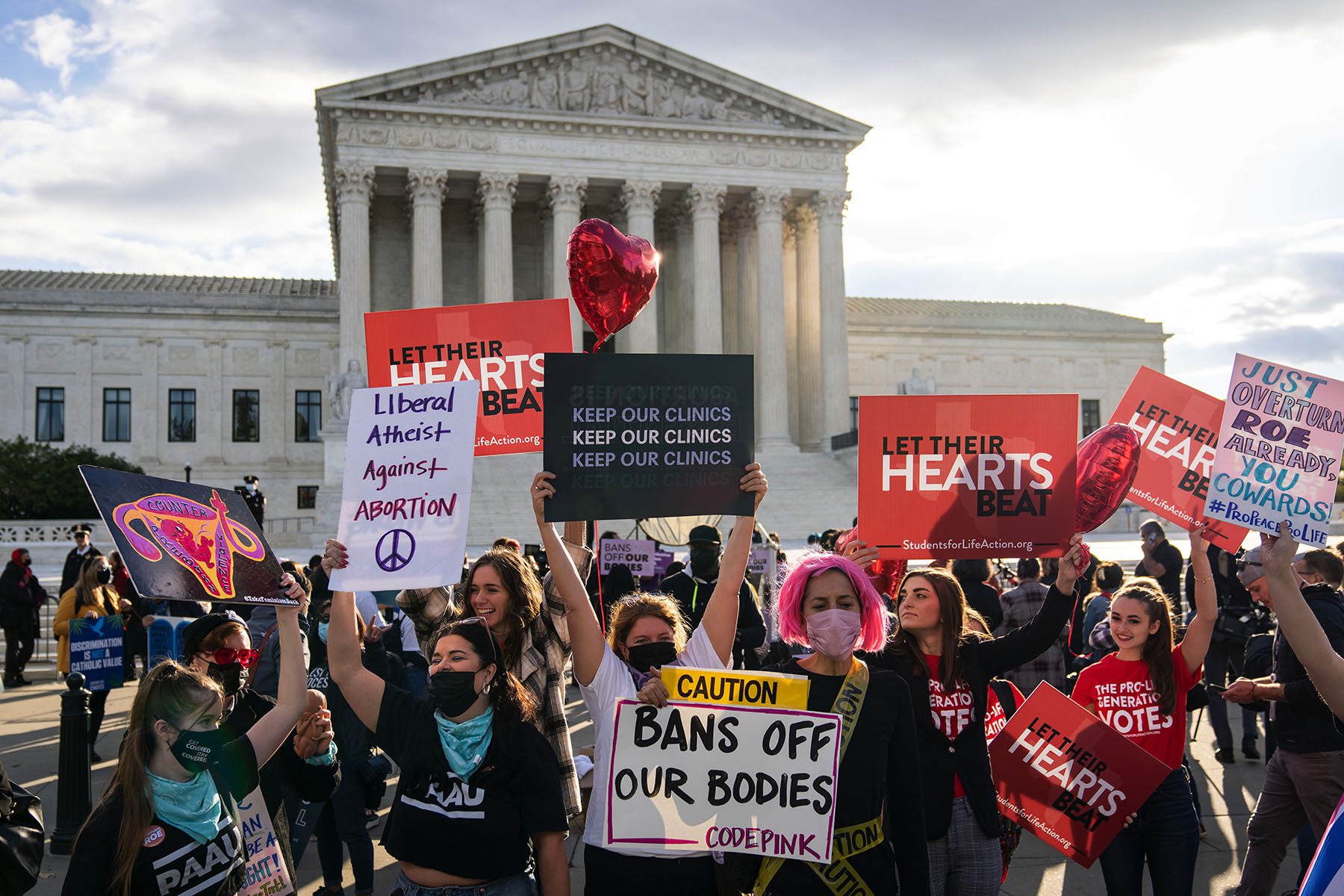The Supreme Court appears poised to allow a lawsuit brought by abortion providers against Texas’ six-week abortion ban to continue, which could restore access for millions of people and discourage other states from pursuing similar legislation.
“It seems to me at least that there is some appetite for getting things back to a status quo in Texas,” said Melissa Murray, a reproductive law expert at New York University. “To restore things to where they were on August 31 as opposed to September 1, and then to allow this challenge to SB 8 to proceed.”
Texas’ six-week ban, known as Senate Bill 8, is largely understood to violate precedent set by Roe v. Wade, which guarantees the right to an abortion up until a fetus can live independently outside the womb. But the word “abortion” was rarely uttered in Monday’s oral arguments, which encompassed two separate cases.
The first, Whole Woman’s Health v. Jackson, pits major Texas abortion providers against the state’s judicial system, which encompasses clerks, judges and other state officials. Those entities would be tasked with adjudicating civil lawsuits brought under the Texas law, which allows private citizens to sue anyone who “aids or abets” an abortion after six weeks, and promises a successful litigant an award of at least $10,000.
In that case, the Supreme Court answered a narrow question: When private citizens are the ones suing, can such laws be challenged in federal court?
The second case, United States of America v. Texas, looks at a different question: whether the United States has the right to challenge the Texas law and whether this particular six-week ban threatens the sovereignty of the U.S. government by creating an avenue for states to circumvent federal law.
A decision on how to proceed with either case could come within days.
The significance of SB 8’s unusual structure and what that might mean for constitutional rights more broadly was a key focus. It is a point newly confirmed Solicitor General Elizabeth Prelogar honed in on during the second argument of the day.
“If the state can just take this simple mechanism of taking its enforcement authority and giving it to the general public, backed up with a bounty of $10,000 or $1 million, if they can do that, then no constitutional right is safe,” Prelogar argued. “No constitutional decision from this court is safe. That would be an intolerable state of affairs and it cannot be the law. Our constitutional guarantees cannot be that fragile, and the supremacy of federal law cannot be that easily subject to manipulation.”
Three of the court’s conservative justices — Chief Justice John Roberts, Justice Brett Kavanaugh and Justice Amy Coney Barrett — indicated openness to the arguments made by Texas’ abortion providers, noting in particular that the law turns state officials into enforcement agents. Both Barrett and Kavanaugh previously voted the opposite way, joining the court’s conservative wing in a September 2 decision allowing SB 8 to take effect.
Barrett asked leading questions about the clinics’ inability to obtain constitutional relief in state court under SB 8, which reveals she might vote in the providers’ favor, said Joanna Grossman, a professor at Southern Methodist University’s Dedman School of Law.
Kavanaugh had already been deemed a likely swing vote. Kavanaugh showed particular skepticism of Texas’ argument and questioned whether the law could be used as a blueprint for other issues beyond abortion, such as restricting gun rights.
Those questions spoke to a deeper issue: Allowing the Texas law to stay in effect could weaken not only the federal government, but the Supreme Court’s overarching authority, by giving states a blueprint for writing laws that violate court precedent but circumvent judicial review.
That appears to be a powerful motivator, suggested Leah Litman, a constitutional law expert at the University of Michigan.
“The court is likely to protect its institutional authority, and that desire will probably unify and unite Democratic appointees and Republican appointees,” she said.
Focusing on the Whole Woman’s Health lawsuit could also allow the court to avoid some of the thornier constitutional questions raised in the U.S. government’s case, she added.
“The U.S. v Texas lawsuit might be — by asking what is the injury to the U.S. — that may be seen as teeing up bigger questions they don’t want to address,” Murray said. “There may be more appetite for the provider suit.”
If the Supreme Court allows the Whole Woman’s Health challenge to proceed, the court could either block the law itself, or send the case back to a lower federal court, the District Court for the Western District of Texas. That court has already once moved to issue an injunction halting enforcement of SB 8 — a decision that was issued by Judge Robert Pitman and then promptly blocked by a federal appeals court.
“It’s pretty clear the injunction will come back,” Litman said. “The district court, having already issued an injunction, is equipped to act fairly quickly.”
Grossman agrees. She believes there’s “no question” the justices are going to block SB 8 in some form, though the specifics of what that might look like are harder to predict. Such a decision could have widespread impact. SB 8 has halted access to most abortions in Texas. Hundreds have traveled out of state for care, overwhelming abortion providers in neighboring states. Most minors are unable to seek abortions.
But any halt to the law could be temporary. The Supreme Court is slated to hear another abortion rights case in exactly one month, addressing the constitutionality of a Mississippi law that would ban abortion after 15 weeks of pregnancy. In that case, the justices are being asked to directly address the central holding of Roe v. Wade. A ruling upholding the Mississippi law would necessarily weaken the Roe protection, and could eliminate it entirely.
“Allowing the law to be enjoined only buys you some time,” Murray said.





